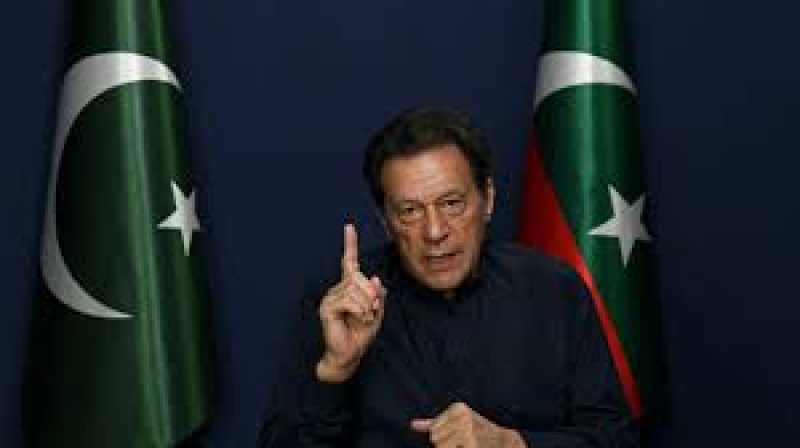- Sri Lanka urges Pakistan to reconsider India match |
- Centre of World Cup storm Mustafizur lands PSL deal with Lahore |
- BNP and Jamaat election camps vandalized in Gazipur |
- Dhaka requests UN rights office investigation into Hadi murder |
- Bangladesh establishes formal diplomatic ties with Grenada |
Imran Khan Faces 14-Year Sentence in Bid to Silence Him

Imran Khan, Pakistan's most popular and outspoken politician, is facing a potential 14-year prison sentence this month in a case that his party claims is part of a broader effort to silence him.
The former prime minister, whose frequent criticisms of the military establishment have long made him a target of powerful generals, has been in custody since August 2023. He faces multiple legal challenges, which he insists are politically motivated.
The longest-running case involves allegations of corruption tied to the Al-Qadir Trust, a welfare organization he founded with his ex-wife. The verdict in this case was postponed for a third time on Monday.
"The Al-Qadir Trust case, like the others, is being dragged out as part of a concerted effort to pressure me," Khan said in a statement shared on social media earlier this month. "But I demand an immediate resolution."
Political analysts believe the military establishment is using Khan's sentence as leverage in negotiations, aiming to neutralize his influence on the fragile coalition government that has kept his party, Pakistan Tehreek-e-Insaf (PTI), out of power after the 2024 elections.
"The military's strategy is simple: Khan is offered release on the condition that he remains silent and docile until the next election," said Ayesha Siddiqa, a London-based author and expert on Pakistan's military.
Politically Motivated Charges
While the military denies any interference in politics, analysts contend that Pakistan's generals are the real power brokers. Khan himself has repeatedly accused the military of undermining democracy and manipulating the political process.
Khan revealed that he was once offered a three-year exile abroad and that he has recently been "indirectly approached" about the possibility of house arrest at his estate outside Islamabad.
"We can only assume that these delays indicate a politically motivated judgment," said Faisal Fareed Chaudhry, Khan's legal advisor. "This case has lost all credibility. Khan will never accept any deal that forces him into silence."
Khan has already faced convictions in four separate cases. While two convictions were overturned by the Supreme Court, the other two sentences have been suspended.
The specialist anti-corruption court is set to announce its verdict on the Al-Qadir Trust case on Friday, two days after government representatives are scheduled to meet PTI leaders in an effort to de-escalate tensions.
PTI officials have consistently refused to engage with the government, which they claim is illegitimate and came to power through the manipulation of the February 2024 elections. PTI leaders have conditioned talks on the release of political prisoners and an independent investigation into alleged abuses by authorities during PTI protests.
Khan has warned that if his demands are not met, he will pull his party out of negotiations and intensify his campaign of civil disobedience, which has already caused significant disruption in the capital.
Protests erupted in late November, following the alleged killing of at least 10 PTI activists by security forces, although the government reports that five security personnel were killed in the unrest.
"The government needs PTI's cooperation to appear legitimate on the domestic and international stage," said Asma Faiz, an associate professor of political science at Lahore University of Management Sciences. "They are likely hoping to offer Khan some form of relief to calm growing criticism."
Stalemate and Political Deadlock
At present, it seems both sides are locked in a stalemate, according to Michael Kugelman, director of the South Asia Institute at The Wilson Center.
"The military may be willing to offer Khan a deal for his release, but Khan is unlikely to accept the terms that would require him to remain quiet," Kugelman told AFP. "The government, on the other hand, is unlikely to agree to an investigation into the violence of November 26. PTI will not relent on that demand."
Exile has been a recurring theme for Pakistani leaders who fall out of favor with the military. Former prime minister Nawaz Sharif spent years in London after serving a brief sentence for corruption before returning to Pakistan in late 2023. Asif Ali Zardari, former president and leader of the Pakistan People's Party, also lived in Dubai after his party clashed with the military.
Despite the precedent, exile does not fit with the carefully cultivated image of Khan, whose political rise was built on promises to challenge dynastic rule and corruption in Pakistan.
"I will live and die in Pakistan," Khan declared in a recent statement shared by his legal team. "I will fight for my country's freedom until my last breath, and I expect my nation to do the same."

